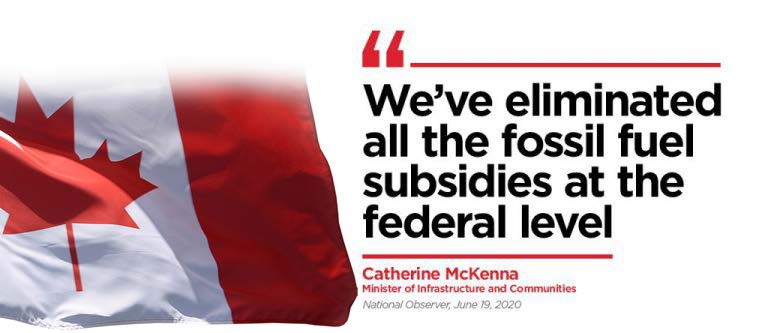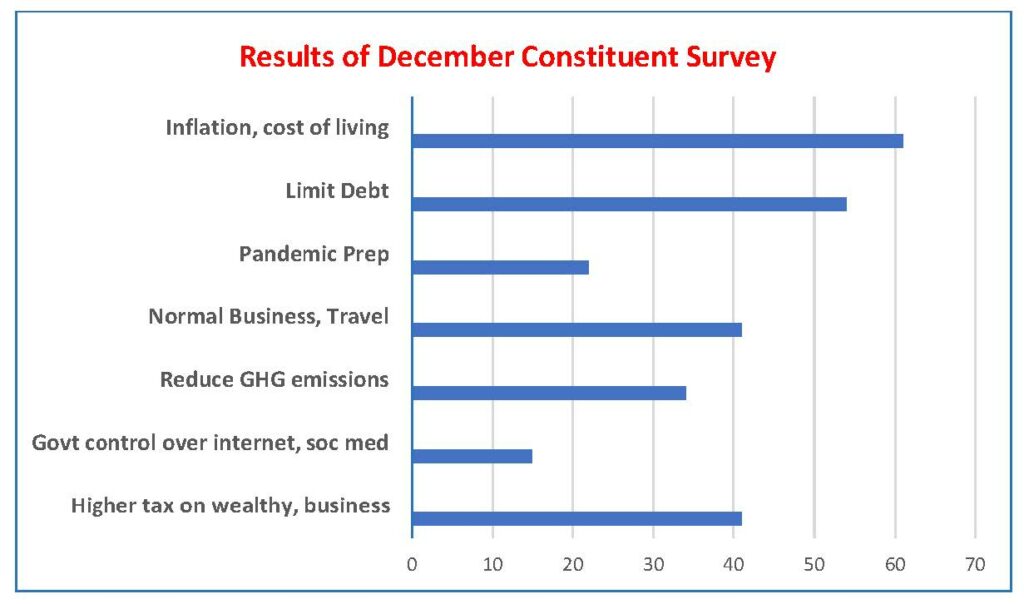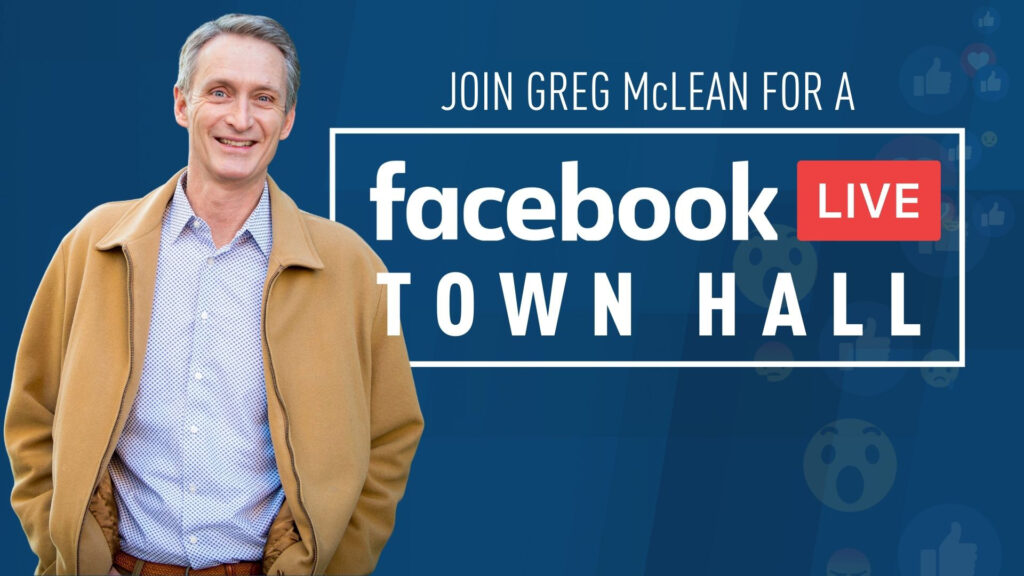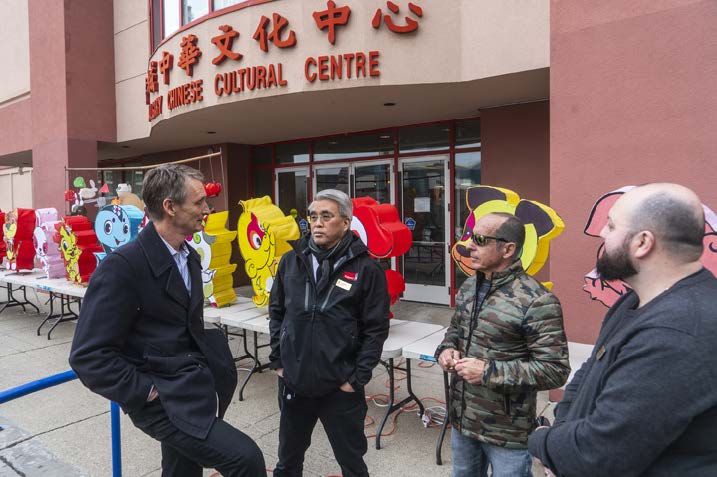E-Newsletter
February 10, 2022

Parliament has been back since January 31 and the Finance Committee, which I vice-chair, has been very busy looking at inflation, debt and housing prices, and also holding several pre-budget consultations with interested groups and individuals.
You’ll see below that the top issue that Calgary Centre constituents want me to focus on is, in fact, inflation and the cost of living; followed closely by issues of debt and deficit. The two are closely related, of course. When government prints too much money, not only do Canadians go into debt but it fuels inflation.
Franco Terrazzano of the Canadian Taxpayers’ Federation gave us some alarming numbers about spending and debt when he appeared before the Finance Committee. Some of his testimony is clipped below.
I’ve also recently been quite deliberate in questioning people who claim that the oil and gas industry is heavily subsidized. On the contrary, I spoke in the House and informed my colleagues that the industry has paid some half a trillion dollars – $500 billion – in taxes over the last 20 years. So I’ve been asking my colleagues to name some examples of oil and gas subsidies. See below for some examples of the nonsensical answers I’ve been getting.
You can find almost all of my interventions in the House of Commons, and several of my key questions at the Finance Committee, in the News section of my website at: https://www.gregmcleanmp.ca/news.

FINANCE COMMITTEE: Alarming Testimony about Government Spending and Debt
I had the opportunity to question Franco Terrazzano, Federal Director of the Canadian Taxpayers Federation, as part of the Finance Committee’s pre-budget consultations.
He told us that the government is on track to increase every Canadians’ share of the national debt to $67,000! He also said the government is tracking to increase the federal debt to GDP ratio to 50%. The government, when questioned about excess spending, loves to point to the debt to GDP ratio, but that is hardly a reassuring number these days! (Note that this government calculates the debt to GDP ratio using apples and oranges: it calculates the GDP for the whole country including provinces, but then uses it only to the federal government debt).
Some argue that the government had to spend money during the pandemic, and there is some truth to that, but we didn’t need to spend more than almost any other country in the G-20. We didn’t need to double the national debt.
The Parliamentary Budget Officer says the government spent $542 Billion from the start of the pandemic period, but a third of that – $176 Billion – was completely unrelated to the pandemic. It was just new spending. Of that non-pandemic spending, the PBO identified $69.2 billion in stimulus spending, $49.9 billion related to “building a better economy”, $24.2 billion in compensation to First Nations children and their families, and $33.3 billion in “other” measures. That’s not very enlightening in understanding how most of that money was used, in addition to the $366 Billion for direct pandemic supports.
The PBO also says the Liberals should reconsider spending another $100 Billion in stimulus spending that they have planned. He believes the country has met the thresholds to end stimulus spending. Remember that when government spends more than needed, inflation goes up because there is too much cash in the economy. See the PBO Report here.
TRACKING DOWN ELUSIVE OIL AND GAS SUBSIDIES
In response to numerous claims that Canada’s oil and gas industry is heavily subsidized, I’ve been asking colleagues and expert witnesses to name an oil and gas subsidy. Just one. The witness from an environmental group named a measure that was discontinued six years ago (see clip below).
The Parliamentary Secretary to the Associate Minister of Finance named exploration tax credits, which were eliminated for oil and gas in the 2017 budget by her own government.
Another Liberal colleague pointed to the purchase of the Trans Mountain Pipeline. That is hardly a subsidy because the government will get its investment back either by collecting tolls from pre-existing contracts, or by selling the pipeline to one of several interested groups.
That colleague also referenced subsidies identified by the International Institute for Sustainable Development. But if you look at their list of what they consider oil and gas subsidies, it includes highway and bridge repairs, reimbursement of aviation revenues lost during the pandemic, the purchase of natural gas power plants in Ontario for electricity generation, and waiving rent for ground leases for airport authorities during the pandemic travel restrictions. It is a real stretch to consider infrastructure and pandemic measures to be oil and gas subsidies, especially for roads and bridges – last we looked, even electric vehicles need roads and bridges.
In fact, the former Liberal Environment Minister, Catherine McKenna, said that Canada has eliminated all fossil fuel subsidies.
Further, a briefing note from Natural Resources Canada (NRCAN) says, “Given the nature of NRCAN’s direct spending (i.e. innovation and environmental performance), the department does not provide any inefficient fossil fuel subsidies that encourage wasteful production or consumption of fossil fuels.”
The oil and gas industry contributes about $25 Billion a year to Canada’s revenues, and is not receiving any subsidies or tax measures that are not equally available to all other Canadian businesses. There is no favouritism to this industry.

Liberal backbenchers joining the chorus for change on ending lockdowns.
Earlier this week, Quebec Liberal Member of Parliament Joël Lightbound held a jaw dropping press conference in which he articulated similar concerns to what we have been saying. Some of the criticism he leveled at his government include:
- “We cannot go back to lockdown and restrictions not supported by science.
- “Now while folks are hearing and seeing all of this, they are left rightfully wondering where the hell are we heading here in Canada? I think there lies the frustration.
- “It is time to stop dividing Canadians to put one part of the population against another.
- “I can’t help to notice with regret that both the tone and the policies of my government changed drastically, on the eve and during, the last election campaign.
- “From a positive and unifying approach, a decision was made to wedge, to divide and to stigmatize. I fear that this politicization of the pandemic risks undermining the public’s trust in our public health’s institutions.
- “I believe the government should quickly provide a road map with clear and measurable targets to lift all restrictions.”
With respect to the gross overstep of imposing a vaccine mandate on crossborder travellers:
- “This is a policy that goes against the World Health Organization’s recommendation,
- “We don’t have any numbers on what we are trying to accomplish,
- “When this measure took effect, the price of transport of fresh products from the U.S. went up by 15 to 20 percent.”
Let’s watch this evolution of thinking and see whether it is an actual indication of a revolt to common sense amongst the Liberal backbench, or a strategy to move the government away from their lockdowns and mandates, and provide Canadians with a path forward that opens our country.
The government has been divisive from the start, including the Prime Minister’s dismissive language, and his refusal to take these objections seriously.
The Prime Minister should remove the vaccine mandate for cross-border travel and other nonsensical rules for all Canadians travelling internationally.
CONSTITUENCY SURVEY RESULTS
In November/December, I asked constituents to return a survey indicating their highest priorities for this Parliament. You were able to select up to three priorities from this list, or write in your own:
- Inflation, bringing down the rising cost of living
- Limiting the debt we are incurring that our kids will pay
- Preparing for pandemics (PPE, domestic vaccine production)
- Allowing travel and business to operate normally again
- Stronger government measures to reduce GHG emissions
- Bringing in government control over social media, internet
- Higher taxes on wealthy individuals and big companies

Inflation and cost of living was the clear top priority to pursue, and I’ve been doing that through my role as the Vice-Chair of the Finance Committee. I have another active survey currently asking if you agree that I should continue pressing the government to reduce spending so as to put the brakes on inflation; and whether the government is on the right track or wrong track in managing the economy. There is also space for your own comments or questions. You can fill out the survey online at: GregMcLeanMP.ca/survey
EVENTS COMING UP

FACEBOOK LIVE
IN PERSON MEET AND GREET – Killarney Glengarry
AROUND CALGARY CENTRE
The first two weeks of February is Lunar New Year, celebrated by the Chinese community as well as other south and south-east Asian cultures such as the Vietnamese and Korean communities. I visited Chinatown to see the colourful lanterns, where I met up with Ward 7 Councillor Terry Wong and his staff, Gary Bobrovitz and Matt Lalonde.

Ruth and I were also pleased to be guests at the Sien Lok dinner, where we met up with Grace Ma and John Dong (dressed as the God of Fortune), along with Minister of Municipal Affairs, Rick McIver and his charming wife, Christine.

Please get in touch if there’s anything my office can do for you.
Greg McLean, M.P.
Calgary Centre
403-244-1880
Greg.McLean@parl.gc.ca
GregMcLeanMP.ca